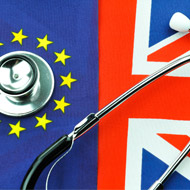Concerns ‘no deal’ Brexit will disrupt veterinary medicine supply

Nearly 55 per cent of those who responded to the survey highlighted potential issues with availability of products.
Less than 15 per cent of animal health companies are prepared for a ‘hard Brexit’, according to a member survey by the National Office of Animal Health (NOAH).
The findings come shortly after the government published its first planning notice for a potential ‘no deal’ Brexit, to outline contingency plans if the UK leaves the EU without any withdrawal agreement. In this instance, it is thought the UK will automatically revert to the World Trade Organisation (WTO) rules.
However, NOAH’s survey suggests the vast majority of respondents are not fully prepared for this to occur by March next year. In contrast, nearly 60 per cent of companies are prepared for a transition period to December 2020, but even this will not be enough in some cases.
NOAH said the findings raise serious concerns that there will not be enough time to carry out a smooth Brexit, without interrupting the vital supply of veterinary medicines.
The organisation stressed that the lack of preparedness is not down to a lack of effort on the part of animal health companies, but reflects the magnitude and complexity of the task.
Furthermore, the government has not yet set out the exact arrangements that will operate in the UK in case of a ‘no deal’ Brexit, meaning it is difficult for the industry to be sure that they are prepared.
Although companies have been doing extensive contingency planning, nearly 55 per cent of those who responded to the survey highlighted potential issues with availability of products, affecting up to more than 40 per cent of their products.
This could affect the full spectrum of product types, across all animal species, but there are particular concerns about the supply chain for vaccines.
NOAH chair Gaynor Hillier said: “The production and supply of veterinary medicines is totally dependent on complex international supply chains that must continue to function effectively after Brexit, their unique status being recognised in the recent government White Paper.
“Raw materials will need to arrive at manufacturing sites and veterinary medicines will need to be transported across borders to meet market requirements. Any border delays, additional complex processes or increased costs will risk medicines availability for UK vets, farmers and all our animals.”



 The latest
The latest